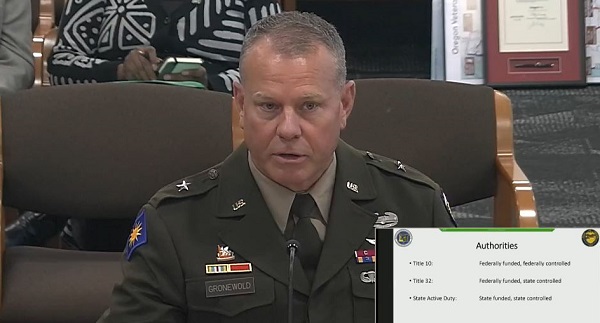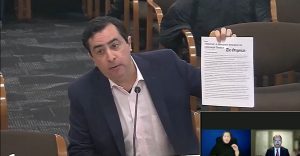National Guard: Our 200 professional citizen-soldiers are Oregonians, not federal agents
9 min read
Presenter: The Oregon National Guard is asked about its mobilization to Portland. Sept. 30 at the Senate Interim Committee On Veterans, Emergency Management, Federal and World Affairs, Brig. Gen. Alan Gronewold:
Brig. Gen. Alan Gronewold (Oregon National Guard): On 28 September, the governor and I received a memorandum from the Secretary of War, calling for us to mobilize into federal service 200 members of the Oregon National Guard under the authority of Title 10, Section 12406. And that was to begin effective immediately.
[00:00:33] My mission, the mission of the Oregon National Guard, is to provide those 200 soldiers to a federal headquarters called Army North in support of their operations with the Department of Homeland Security, ostensibly to provide security to the ICE facility in Portland.
[00:00:54] The Title 10 mission—the federal mission—is beyond my control and yet to be determined, but we believe it will be to secure federal property and possibly personnel. But that remains to be seen and that’s beyond the control of myself and the governor, my commander in chief.
[00:01:11] In order to accomplish our mission of providing 200 soldiers, we have activated one military police company, one infantry company, and one battalion headquarters, and that will be sufficient to provide 200 soldiers.
[00:01:25] For the next few days, our soldiers will report to duty. They will conduct in-processing where they’ll be medically screened and administratively screened to go on to Title 10. And then the Title 10 force will give them training in the proper rules of the use of force and protective crowd control training. And that is also beyond our control or beyond the scope of our mission in the Oregon National Guard.
[00:01:54] As stated earlier, Army North will assume command and control of our Oregon National Guard soldiers and they’ll be on mission for 60 days with an additional 20 days to do in-processing and potentially take leave and adjudicate any medical or administrative issues upon completion of the mission.
[00:02:12] So we expect this mission to end on or about Dec. 16. The first day, start date, is Sept. 28.
[00:02:21] Presenter: Chair of the committee, Sen. James Manning:
[00:02:24] Sen. James Manning: Well, first let me start off with saying, thank you. That is a huge issue right now when we activate citizens from Oregon to participate in an operation that they’re really not trained to do. These soldiers are trained to do combat missions, and missions around the world, and they do that admirably. I believe that we already have Oregon National Guard still in Poland, or other places where they’re in harm’s way right now.
[00:03:03] My question would be, as far as the national disasters that we have here, which should normally—would—where I already understand that the Title 10, what that does, but it also stretches the ability of our National Guardsmen to conduct state businesses at the same time. So I’m interested in knowing what are the holes that you see right now with those soldiers being activated for this show?
[00:03:37] Brig. Gen. Alan Gronewold (Oregon National Guard): Chair Manning: Thank you, I understand the question. Despite having a large number of soldiers still mobilized in federal service, serving in the Horn of Africa, in countries of Somalia and Djibouti, and despite the recent demobilization of soldiers from Egypt, Iraq, and Syria and Kuwait, we still have the capacity to provide wildland firefighting forces to the state of Oregon in the event of an extended wildfire season or other disaster relief, in addition to the 200 soldiers that we’re providing to Title 10 for this in-state mission.
[00:04:17] Presenter: Sen. Mark Meek:
[00:04:19] Sen. Mark Meek: The mobilization order, can the president or the call-up be cancelled early? Do they have to do the whole 60 days or once they’re called up, is there any chance they could shut it off early?
[00:04:37] Brig. Gen. Alan Gronewold (Oregon National Guard): Chair Manning, Vice Chair Thatcher, Sen. Meek: The answer to the question is yes, the mission, the mission order can be curtailed to end earlier, but it will not extend beyond the 80 days, as I currently understand it.
[00:04:53] Sen. Mark Meek: And then when it came to the military police company that you are dispatching of the infantry company, was that specifically requested or was that out of trying to have some of our National Guardsmen and women that are semi-trained to deal with some types of—those types of endeavors?
[00:05:15] Brig. Gen. Alan Gronewold (Oregon National Guard): Chair Manning, Vice Chair Thatcher, Senator: To answer that question, the Oregon National Guard was allowed to select the units and the forces to provide to the Title 10 command. The reason those two units were selected is because they have training or have recently been trained as a National Guard Response Force, which is a crowd control force that we keep trained at all times. The training rotates between units, but the military police company was a natural fit and the infantry company had also received recent training on that mission.
[00:05:55] Now I will say that since our soldiers are being activated in a Title 10 status and not a Title 32 status, they are more limited in the support they can provide to law enforcement. That is, there are more constraints on Title 10 forces than there are on Title 32, in accordance with the Posse Comitatus Act.
[00:06:17] Presenter: Senator Pham later asked him to explain the Posse Comitatus Act. Brig. Gen. Gronewold:
[00:06:24] Brig. Gen. Alan Gronewold (Oregon National Guard): I can give you a layman’s explanation as I understand it, but I’m not a lawyer, so this is not a legal definition, but the Posse Comitatus Act came into effect some time after the Civil War to prevent a standing army from being used in law enforcement capacity in the United States. So what that effectively means to me is that while our soldiers are mobilized on Title 10, they are restricted from performing law enforcement actions and the actual act itself defines what those actions are.
[00:06:58] Presenter: Sen. Mark Meek:
[00:06:59] Sen. Mark Meek: We’ve been working with and navigating our National Guardsmen and women, whether they’re considered veterans or not. Will these deployed National Guardsmen and women, will they be considered veterans after this callup?
[00:07:11] Presenter: Legislative Affairs Director Russell Gibson:
[00:07:15] Russell Gibson (Legislative Affairs, director): We’ll have to look at the duration. So, many of the soldiers have deployed in the past and so they would already be considered veterans. But for those who have not, going into this Title 10 deployment, honestly, we’ll have to look at it and the duration may be the issue here.
And we’ll have to look at, as Gen. Gronewold mentioned, the Title 10 authority, the specific authority under which they’re deployed, they’re mobilized, also impacts that. So we’ll have to get back to you on that.
[00:07:36] Presenter: Sen. Meek:
[00:07:38] Sen. Mark Meek: I was serving in the Air Force and we had sensitive areas that we posted that deadly force can be used on those, you know, to enforce security. And when our National Guardsmen and women with our training that you provided, they are, I would hope, trained on the use of deadly force. Because what I’m hearing, the tweet, per se, that ‘full force’ will be authorized, what does ‘full force’ mean versus ‘deadly force’?
[00:08:07] Brig. Gen. Alan Gronewold (Oregon National Guard): Chair manning, Vice Chair Thatcher, Senator: To answer your question, I don’t want to speculate on what level of training they will be trained in or what they will be authorized to perform, as far as rules for the use of force. The Title 10 headquarters will provide that training to them. It is my understanding, however, that protective crowd control will be one of the things they’re trained upon.
[00:08:33] And I will provide my advice to the Title 10 commander that Oregon National Guard men and women, they serve two purposes: one, to defend America; and two, to protect Oregonians. And so by serving this mission they will be protecting any protesters at the ICE facility. That’s my desire.
[00:8:56] Now to answer your question, ‘full force’ is not a doctrinal term that the Army uses, so I’m not sure exactly what that means, and I don’t want to speculate as to what level of force they will be allowed to use.
[00:09:08] Presenter: Sen. James Manning:
[00:09:10] Sen. James Manning: Those soldiers that have been stationed or en route, what is the motivation level? What is it, what is the unit motivation? What does that feel like, what does that look like?
[00:09:22] Presenter: Russell Gibson:
[00:09:23] Russell Gibson (Legislative Affairs, director): Chair Manning, Vice Chair Thatcher: So far as Gen. Gronewold mentioned, right, we swore an oath to follow both the orders of the president of the United States and the governor of the state of Oregon. And so that’s what we do.
[00:09:33] And the soldiers are on board with that. They know they’re going to do their job and they’re going to do it professionally. We have very professional soldiers. We mentioned the 1186th MP Company, Military Police Company. Roughly half of those soldiers are law enforcement officers in their civilian world. And so they have that level of professionalism as well, and they’re going to do their job as professionals.
[00:09:52] You know, we expect everybody to be on the ground today and tomorrow as we start to in-process. And we’ll get a better sense as we get those soldiers in processing. But so far we’ve had, not only have we directed those units, but then because some soldiers are either medically disqualified or a number of other reasons, we’ve had to cast a wider net and request volunteers. And we’ve had a number of soldiers in our other units volunteer for the mission as well. So I would say it’s (morale) it’s pretty high.
[00:10:17] Presenter: With a request for the people of Oregon, Brig. Gen. Gronewald:
[00:10:21] Brig. Gen. Alan Gronewold (Oregon National Guard): Chair Manning, may I make a request of this committee and your colleagues in both the House and the Senate? (Please.) My number one concern is the protection and the care of my soldiers while they’re deployed on this mission. And many of our citizens will not see a distinction between our Oregon National Guard citizen-soldiers and ICE agents, federal protective service agents, and other federal agents.
[00:10:48] And I would just like to request of each of you, and please pass this on to your colleagues, that our soldiers are—we’re the home team, and our job is to protect and serve Oregonians, and we follow lawful orders, and that’s what we’re doing, and to please treat them with dignity and respect as fellow Oregonians. Thank you.
[00:11:09] Russell Gibson (Legislative Affairs, director): Thank you for that, sir.
[00:11:11] Sen. James Manning: Yes, sir, I appreciate that. And, you know, a couple of weeks ago, I was honored to meet with some West Point cadets. And I explained to them that, you know, you have signed this contract. You put your name on a dotted line to protect and defend the Constitution of the United States against all enemies foreign and domestic, and that you bear true faith and allegiance to the same. But it doesn’t say in there that you will worship any man or any would-be tyrant or whatever the case may be. And the West Point cadets, they affirmed that.
[00:11:49] And also, we kind of went back and referenced the Uniform Code of Military Justice, which demands that you disobey any unlawful order. So I know these soldiers are trained and they understand the difference between a lawful order and an unlawful order.
[00:12:10] My prayers are with the men and women of the Oregon National Guard at this time, the people in Portland, everyone that drives through Portland, and our great state of Oregon.
[00:12:21] Presenter: An Oregon Senate committee hears about the National Guard’s deployment to Portland. The brigadier general asks that his 200 National Guard soldiers be treated as fellow Oregonians, rather than as federal agents.






